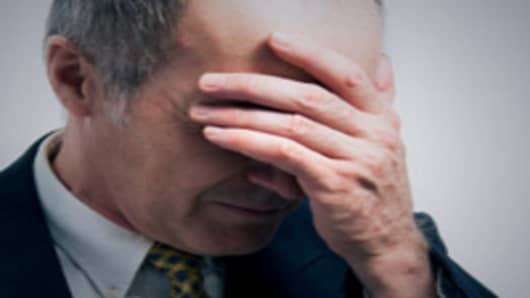Tech giants Google and Apple are the most notable to have experienced its impact, but many across the globe have seen the effect a chief executive's illness can have on a company’s share price.
The uncertainty associated with a sudden announcement of medical leave of a senior executive hits some firms harder than others, and the level of understanding differs widely, experts told CNBC.com.
Ton Büchner, chief executive of the world’s largest paint maker AkzoNobel , became the latest CEO to succumb to fatigue. The company announced that, after just five months in the CEO’s chair, Büchner was taking a short-term medical leave.
AkzoNobel shares fell 5.52 percent on the news and the company declined to comment further on the matter.
Alan Miller, founding partner of wealth management firm SCM Private, told CNBC that markets simply do not like uncertainty associated with an illness, and that shares will be sold off depending on the CEO’s standing.
“Markets always discount on uncertainty,” he told CNBC. “If market expectations of a company and its CEO are low, the discount is correspondingly low, showing that markets don’t care much. If expectations [of a company] are high and its CEO is high regarded, then the discount is high when the CEO goes on leave. Markets do not like the uncertainty of undefined leadership.”
Miller added that the discount also depends on the state of the company. A year ago Lloyds Banking Group said its chief executive, António Horta Osório, was taking two months' leave for suspected fatigue after just six months in the job.
Shares in the bailed-out British bank tanked 4.5 percent on the FTSE 100 after the news emerged, equating to a 12 billion pound ($19 billion) loss for British taxpayers who had a 41 percent stake in the group. Reuters reported that concerns swiftly spread over a “leadership vacuum.”
Richard Harris, chief executive of Port Shelter Investment, told CNBC that despite a general sympathy for illness, stable management was vital for investors.
“If there’s a medical issue, then of course one understands, but if it’s stress-related you do tend to think: Hey, that’s what you get paid the big bucks for,” he said.
Harris added that corporate boards have tended to be too lenient on CEO absences.
“In general, boards are too soft, they give CEOs more slack than they would over lower-down employees,” he said. “Boards should be more ruthless and ask themselves, ‘Can this man do the job?’ ”
Harris added: “If you’re an investor or analyst, you want to see strong management. The share price reflects this.”
During his brief tenure at Lloyds before his two-month absence, Horta Osório had engaged in a micromanagement style of restructuring the financially beleaguered group — which posted a 3.2 billion pound ($5.2 billion) loss in the first three quarters of 2011. He also oversaw a management overhaul, an action that spooked shareholders as it meant there were few candidates within the board that could replace him.
Port Shelter’s Harris said that, as an investor, this was a warning to carefully consider before investing.
“Even if the remaining team are strong, if a company appears leaderless it’s a red flag. The uncertainly can lead to difficulties,” he said.
When Horta Osório finally returned to his post in January, the company's shares climbed 4.28 percent.
Tech Giants and ‘Iconic’ Leadership
Google and Apple are two of the biggest tech companies to experience the effects of CEO illness.
In June, the absence of Google's Chief Executive Larry Page from the company's shareholder meeting raised eyebrows and weighed on the company's share price, despite Google's attempts to reassure investors. The company insisted Page was suffering from a voice condition, and that it was nothing serious.
The rumor mill went into action when Google CEO Eric Schmidt canceled Page's public engagements for weeks ahead. Investors feared that "weeks ahead" signaled bad news and as Wall Street speculated, Google's shares fell.
Markets were nervous about Page's disappearance, as memories of the late Steve Jobs, Apple's co-founder, were fresh in investors' minds.
When Jobs announced that he had pancreatic cancer, Apple investors panicked. His insistence that the cancer had been removed failed to calm their nerves. Apple shares continued to tumble as two more bouts of medical leave were announced — investors feared that without Jobs' involvement, the company's creative edge would be lost.
After Jobs passed away in October 2011, Richard Harris and Alan Miller both agreed that Apple had acted decisively to mitigate the effects of losing Jobs’ creative vision and iconic status.
“Even though he was the ideological pinnacle of Apple, he hadn’t been running the company for large chunks of time and markets and investors had time to get used to his absence,” Harris said.
Miller added that Apple was able to rise to its current share price highs — topping $700 a share — because of management foresight.
“Look at Apple now,” he said. “Steve Jobs rescued that company single handedly and was the company’s vision, but when he died the share price rose. That’s because the company had put in strong structure and strong management going forward.”



